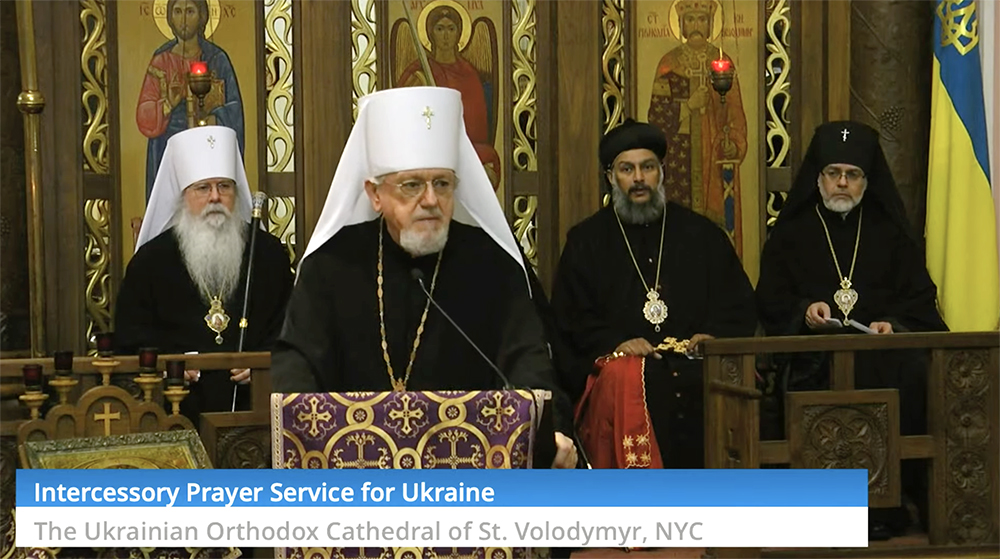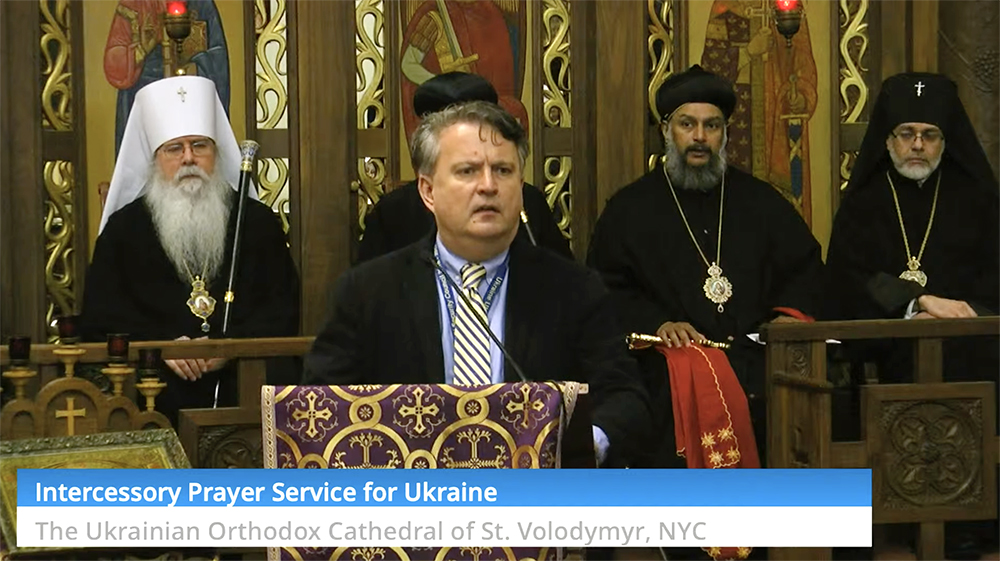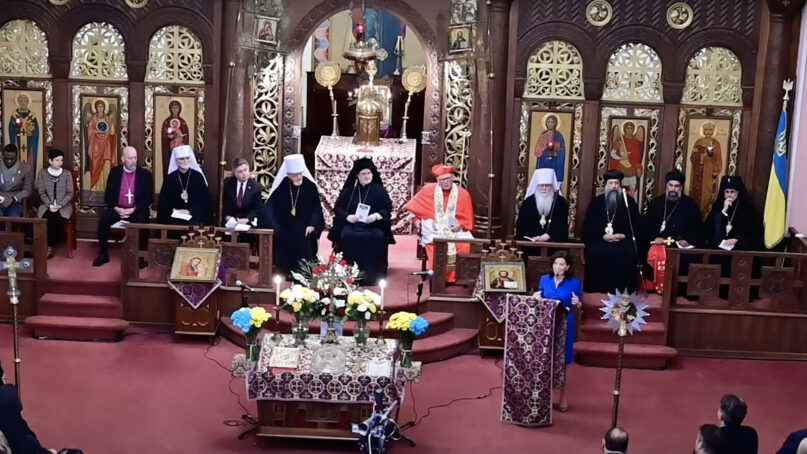(RNS) — Ambassadors, elected officials and a group of interfaith clergy joined with Orthodox Christian leaders in New York on Wednesday (March 9) to express solidarity with Ukrainians as they resist the ongoing invasion of their country — and to decry the Russian leaders at the helm of the conflict.
The slate of dignitaries gathered at the Ukrainian Orthodox Cathedral of St. Volodymyr in Manhattan’s Upper West Side neighborhood for what was described as an “Intercessory Prayer Service for Ukraine.” Attendees and speakers represented an array of faiths, ranging from Ukrainian and Greek Orthodox prelates to Catholic cardinals to Jewish rabbis.
Metropolitan Antony of Hierapolis of the Ukrainian Orthodox Church of the USA opened up the speaking section of the service by outlining a history of what he said were wrongs inflicted on the Ukrainian people by Russia.
“After 30 years of independence, recognized by the world over — did we ever think that we would be going back to this that we see today?” he said.
He celebrated the outpouring of international support for Ukraine during the invasion, and thanked all of those who have done more than simply say “You’re in our thoughts and prayers.”
“This has been a movement that has swollen beyond all imagination in terms of the the desire for people to help, to do something and to fall on their knees and pray,” he said. “I can tell you the people of Ukraine tell us that they feel the power of those prayers.”

Metropolitan Antony of Hierapolis of the Ukrainian Orthodox Church of the USA addresses the “Intercessory Prayer Service for Ukraine” at the Ukrainian Orthodox Cathedral of St. Volodymyr in Manhattan, March 9, 2022. Video screen grab
He was followed by New York Gov. Kathy Hochul, who noted that the cathedral, just a few blocks west of Central Park, was once a synagogue.
RELATED: Among Russian Orthodox, glimmers of dissent against the invasion of Ukraine
“When I look out of this room, yes, I hear the words of prayer on your lips — and those are powerful words, heartfelt words — and I see tremendous pain in your eyes,” she said.
“But as I hear the prayers and I see the pain and sense the weeping in your hearts for the people left behind, I also sense defiance in your souls.”
Hochul said the state of New York will reject business “with Russian interests or the Russian state” as part of “a global effort to bring that nation to its knees and regret the day they ever attempted to subjugate the great country of Ukraine.”
Rabbi Joseph Potasnik, executive vice president of the New York Board of Rabbis, recalled the horrors of the Holocaust during World War II. He noted Ukraine President Volodymyr Zelenskyy is Jewish, lost family during the Holocaust and had a grandfather who fought the Nazis with the Soviet Union’s Red Army. Between 1.2 million and 1.6 million Jews were killed in Ukraine during the Holocaust.
“When we said never again after the war, we didn’t put a question mark after it — we put an exclamation mark,” Potasnik said.
“We can discuss and debate a no fly zone, but there is one thing we can’t debate, and that is this should be a no-cry zone. … We should never, ever see innocent people mercilessly murdered.”
Potasnik referenced the approaching Jewish holiday of Purim, which commemorates the triumph of the Jewish people over Haman.
“Haman wanted the Jewish people to submit to his rule, and they did something he didn’t expect: They fought back,” Potasnik said. “Ultimately, Haman was relegated to the dustbin of history, and the people were victorious. I hope the president of Russia reads the story, that maybe this year will be called ‘Putin’s Purim’ because we have learned that history often repeats itself.”
The rabbi rejected Putin’s attempts to justify the invasion as an effort to “denazify” Ukraine, saying, “On the contrary, what you are doing in assaulting Ukraine is Nazification.”
Catholic Cardinal Timothy Dolan, who oversees the Archdiocese of New York, called the invasion “raw evil” and “irrational” in his remarks. He recounted a recent conversation with a journalist who worked in the country who described faith as uniting the Ukrainian people.
“God save Ukraine,” Dolan said.

Sergiy Kyslytsya, Ukraine’s ambassador to the United Nations, speaks at the “Intercessory Prayer Service for Ukraine” at the Ukrainian Orthodox Cathedral of St. Volodymyr in Manhattan, March 9, 2022. Video screen grab
It was Sergiy Kyslytsya, Ukraine’s ambassador to the United Nations, who offered one of the morning’s longest speeches. Kyslytsya made headlines in recent days for telling his Russian counterpart that “There is no purgatory for war criminals. They go straight to hell.” The ambassador reiterated those remarks on Wednesday, referring to the Russian ambassador as a “herald of Satan.”
“I don’t know if it is really true — you can tell me,” Kyslytsya said, gesturing to the religious leaders behind him. “But I’m sure that if he doesn’t repent, he goes to hell.”
RELATED: ‘A religious politician’: Head of US Ukrainian Orthodox Church slams Moscow Patriarch Kirill, Putin
Stressing his own belief in God, Kyslytsya drew parallels between the biblical story of the Israelites leaving Egypt in pursuit of the Promised Land and Ukraine’s pursuit of independence.
“Today there is no man who, in the face of God, shall say that the Ukrainians haven’t got faith,” he said. “We will not fail this time. We will not fail ever because we believe in God.”
He closed by quoting Taras Shevchenko, a famous Ukrainian poet and writer: “Keep fighting — you are sure to win! God helps you in your fight! For fame and freedom march with you, and truth is on your side!”
When Kyslytsya finished, the crowd rose to offer a standing ovation.
Archbishop Elpidophoros of America, a prelate of the Greek Orthodox Church, spoke next. The leader of his tradition, Ecumenical Patriarch Bartholomew, played an unusual role in the development of Orthodox Christianity in Ukraine: After many of Ukraine’s Orthodox Christians declared independence from the Orthodox Patriarchate in Russia in 2018, Bartholomew recognized the new body — an act of defiance against the Russian Orthodox Church, which refused to.
Elpidophoros said the recent bloodshed in the region “must be set squarely upon the shoulders of Vladimir Putin … who is risking global peace for his own selfish political agenda.”
Decrying violence as sinful, Elpidophoros declared “no war can ever be called holy, or even just, in an attempt to rationalize it as morally acceptable.”
Like many speakers, he celebrated the “incredible courage” of the Ukrainian people as they stood up against the Russian invasion. But the prelate also lauded Russians who have protested the war inside Russia — a group that includes some Russian Orthodox priests.
They are “risking their freedom and perhaps even their own lives as they protest this unprovoked and unreasonable attack,” Elpidophoros said.
Archbishop Daniel of the Ukrainian Orthodox Church of the USA concluded the litany of speeches with a reminder of the human tragedy wrought by the ongoing conflict. He said that shortly before the service, he received a text message from an archbishop taking refuge in a church basement near Mariupol, Ukraine. The prelate informed Daniel that a hospital where “mothers were giving birth to children” had just been bombed. News of the attack broke during the service, with Zelenskyy blaming Russian forces and calling it an “atrocity.”
“He says the streets of Mariupol are covered with blood,” Daniel said, citing the text message from the archbishop. “Even though the Russian Federation has promised to create a safety corridor they have violated the promises over and over and over again.”
He asked those in attendance to stand and observe a moment of silence.
“Pray according to your tradition, regardless of where we come from — we’re all united in prayer,” he said.
As he finished, a group of seminarians began singing a hymn written in the wake of protests that rocked Ukraine in 2013-2014, with demonstrators rejecting a Russian-aligned government. The song, whose tones oscillate between inspiring and haunting, is meant to commemorate the “heavenly hundred” — or the first hundred or so protesters killed during the demonstrations.





